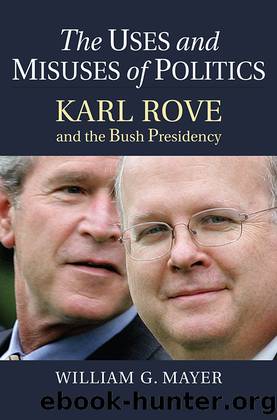The Uses and Misuses of Politics: Karl Rove and the Bush Presidency by William G. Mayer

Author:William G. Mayer [Mayer, William G.]
Language: eng
Format: epub
ISBN: 9780700630530
Google: XgSYzQEACAAJ
Goodreads: 55560125
Publisher: University Press of Kansas
Published: 2021-03-29T00:00:00+00:00
WORLDCOM
When Enron sought chapter 11 protection in December 2001, it was, as measured by the companyâs total assets, the largest bankruptcy filing in US history. Enron didnât keep that title for long, however. In July 2002, WorldCom, a Mississippi-based telecommunications company with assets almost double those of Enron, also filed for bankruptcy.41 By that time, most of the accoutrements of scandal were already visible: the resignations of the companyâs chief executive officer, its chief financial officer, and other top executives; a precipitous drop in share prices; and, most relevant to this discussion, allegations of shoddy and misleading accounting practices.
Much like Tyco, first reports of the WorldCom scandal seemed to indicate that the wrongdoing had taken place entirely during the Bush presidency. In late June 2002, WorldCom announced that it had overstated its cash flow during 2001 and the first quarter of 2002 by more than $3.8 billion. (Specifically: it had treated operating costs as capital investments, thus allowing the company to substantially reduce its reported expenses and inflate its profits.) Instead of a profit of more than $1.5 billion during those five quarters, WorldCom had actually lost money. Just as with Tyco, however, it soon became clear that WorldComâs problems did not suddenly commence when George W. Bush entered the White House. In early August 2002, the corporation announced an additional $3.3 billion in improperly accounted expenses, this time beginning in 1999. In November, the Securities and Exchange Commission filed additional fraud charges against WorldCom, alleging $2 billion more in accounting manipulations, again beginning in 1999. In sum, WorldCom started cooking its books when there were still two years left in Clintonâs second term.42
Far from being an example of how corporations run wild whenever a Republican is in the White House, then, the corporate scandals of the early 2000s were really a symptom of the âirrational exuberanceâ that took hold of the American economy during Bill Clintonâs second term. Enron, Tyco, and WorldCom were all very successful companies at one point in their histories, which led their executives to believe that almost anything they touched would turn to gold. It also tempted them to cross a lot of ethical and legal boundaries they might have respected earlier in their careers.
None of this means that Bill Clinton is the real villain in all these scandalsâthough if one is determined to find some top government official to cast in that role, Clinton is a far more plausible candidate than George W. Bush. Corporate scandals were simply the downside of what otherwise was a time of remarkable economic prosperity. On the other hand, in studying the messes that developed at Enron, Tyco, and WorldCom, one never gets the sense that top executives were restrained by the fear of hypervigilant federal regulators and prosecutors. Had a profusion of corporate scandals taken place in 1993, at the beginning of the Clinton presidency, the major news media would almost certainly have interpreted them as just one more example of the âexcessesâ of the Reagan era. The
Download
This site does not store any files on its server. We only index and link to content provided by other sites. Please contact the content providers to delete copyright contents if any and email us, we'll remove relevant links or contents immediately.
The Secret History by Donna Tartt(16662)
The Social Justice Warrior Handbook by Lisa De Pasquale(11494)
Thirteen Reasons Why by Jay Asher(7803)
This Is How You Lose Her by Junot Diaz(5800)
Weapons of Math Destruction by Cathy O'Neil(5046)
Zero to One by Peter Thiel(4835)
The Myth of the Strong Leader by Archie Brown(4796)
Promise Me, Dad by Joe Biden(4459)
Beartown by Fredrik Backman(4434)
Stone's Rules by Roger Stone(4423)
How Democracies Die by Steven Levitsky & Daniel Ziblatt(4414)
The Fire Next Time by James Baldwin(4351)
100 Deadly Skills by Clint Emerson(4086)
A Higher Loyalty: Truth, Lies, and Leadership by James Comey(4041)
Rise and Kill First by Ronen Bergman(4021)
The David Icke Guide to the Global Conspiracy (and how to end it) by David Icke(3892)
The Farm by Tom Rob Smith(3878)
Secrecy World by Jake Bernstein(3789)
The Doomsday Machine by Daniel Ellsberg(3738)
